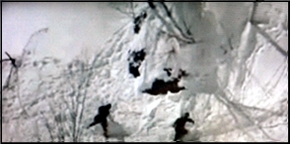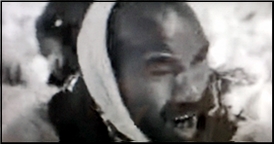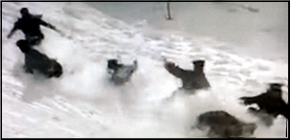Mon 28 Dec 2020
A Movie Review by Jonathan Lewis: SNOW TRAIL (1947).
Posted by Steve under Crime Films , Reviews[7] Comments
SNOW TRAIL. Toho Company, Japan, 1947. Original title: Ginrei no hate. Toshirô Mifune, Takashi Shimura, Yoshio Kosugi. Director: Senkichi Taniguchi. Currently streaming on the Criterion Channel.

Fairly early on in Snow Trail, the viewer learns that there are three escaped bank robbers and that they’re hiding out somewhere in remote, cold mountainous terrain. Enter what appears to be an urban police detective who is working with local authorities to apprehend the men.
And then the movie shifts to a resort where two employees, who heard on the radio that one of the fugitives is missing several fingers, are seen scheming as to how they can get one of the resort’s guests to remove the glove he wears all the time.

At this point, it’s not clear whether the movie is going to be a police procedural, a film noir, or something else entirely. Indeed, it takes about another thirty or forty minutes for the central story of the movie to come into its own and by that time, you’re hooked.
After one of the three fugitives purportedly dies, the remaining two men must struggle to survive amidst the cold, desolate landscape. Luckily for them, they find shelter in a mountain cabin inhabited by an old man, his granddaughter, and a mountaineer who is literally weathering an oncoming storm with them.

It’s then when the two men, portrayed by Japanese film legends Takashi Shimura and Toshiro Mifune, begin to clash. The older of the two criminals, Nojiro (Shimura) becomes wistful and introspective. Although it’s never made absolutely explicit, one senses that he is beginning to have deep, painful regrets about his life choices.
Eijima (Mifune), on the other hand, grows more cold, more divorced from humanity, and increasingly willing to utilize violence. There’s a chillingly effective scene in which Ejima barks at his erstwhile colleague for merely enjoying listening to music. He’s the character who has gone spiraling downward into darkness.

In many ways, Snow Trail has all the hallmarks of film noir and was clearly influenced by American crime films. But it’s also an existentialist work and a redemption story. The movie is fundamentally about one man, alone against a giant landscape of mountains and sky, who realizes too late that he has fundamentally wasted his life on crime rather than on family and connection to nature.
Compared to Japanese crime films of the 1960s and 1970s, this little-known film may not be particularly compelling cinematically. But it’s a solidly constructed work of Japanese postwar cinema that deserves a look.
December 28th, 2020 at 8:09 pm
Kurasawa’s HIGH AND LOW does something similar in not being the procedural noir or suspense film alone that it seems to be at first glance. Japanese culture often played with Western expectations of how genre stories were going to develop.
December 28th, 2020 at 9:28 pm
I wish I had more experience with Japanese films. I’ve seen the usual handful; maybe a couple dozen at most. The most fulfilling was once when I had an opportunity to see ‘Stray Dog’ on the big screen. The simplicity is what always strikes me, as this ‘Snow Trail’ story does. Another review on this site –for a similar plot –also whets my appetite: ‘Valley of Eagles’ by Terence Young. I learned about it here. What’s better than these narratives which explore crime or intrigue and at the same time, bring the audience out of our downtowns and our suburbs and into raw, natural, wilderness?
Tangentially related: a non-profit group is assembling an enormous space in Montana which will revert to the authentic flora and fauna of the old west. It will be the size of the state of Connecticut, with bison herds and wild horses and everything just the way it was.
It’s called the American Prairie Reserve.
Link:
https://en.wikipedia.org/wiki/American_Prairie_Reserve
December 28th, 2020 at 10:20 pm
Reviews like this are the spice of my life and the bane of my existence –another film to put on my “must find” list!
December 28th, 2020 at 11:32 pm
Criterion Channel is having a Japanese noir retrospective in January
JAPANESE NOIR
Featuring a new introduction by Imogen Sara Smith
Stray Dog, Akira Kurosawa, 1949
Black River, Masaki Kobayashi, 1956
I Am Waiting, Koreyoshi Kurahara, 1957
Rusty Knife, Toshio Masuda, 1958
Stakeout, Yoshitaro Nomura, 1958
The Bad Sleep Well, Akira Kurosawa, 1960
Intimidation, Koreyoshi Kurahara, 1960
Take Aim at the Police Van, Seijun Suzuki, 1960
Zero Focus, Yoshitaro Nomura, 1961
Pigs and Battleships, Shohei Imamura, 1962
High and Low, Akira Kurosawa, 1963
Youth of the Beast, Seijun Suzuki, 1963
Cruel Gun Story, Takumi Furukawa, 1964
Pale Flower, Masahiro Shinoda, 1964
Branded to Kill, Seijun Suzuki, 1967
A Colt Is My Passport, Takashi Nomura, 1967
December 29th, 2020 at 2:58 am
Good films there – The Bad Sleep Well is a version of Hamlet and Branded to Kill is one of the strangest films ever made.
Seijin Suzuki was a very good director of standard noir and historical B-movies – which in Japan were made to a very exact formula – but he got bored and allowed his sense of humour to emerge.
December 29th, 2020 at 8:38 am
Thank you very much for the highly informative review.
This is a picture and director of whom I’ve never heard. They sound “don’t miss”.
I’ve only seen a portion of these Japanese noir.
I’d recommend:
Stray Dog, Akira Kurosawa, 1949
The Bad Sleep Well, Akira Kurosawa, 1960
Take Aim at the Police Van, Seijun Suzuki, 1960
High and Low, Akira Kurosawa, 1963
Pale Flower, Masahiro Shinoda, 1964
Branded to Kill, Seijun Suzuki, 1967
A Colt Is My Passport, Takashi Nomura, 1967
“High and Low” is my favorite of these – it’s terrific.
David Bordwell (film historian) says the three most important national cinemas are the French, Japanese, and American (Hollywood + independents). Most film historians would agree, although many would hold out to include the Italians too.
December 29th, 2020 at 3:51 pm
Bordwell’s remark confuses me. Wonder what his criteria for that statement was. After all, Britain had a socko hard-boiled noir period; and what’s better than an Ealing comedy?
When it comes to Japan, I’ve probably seen more of their great anti-war dramas than their crime tradition. In anti-war, they are unmatched in sensitivity. Their crime films –well, the few I’ve seen, seem to hint at a ‘more intense’ mode which –if I can say so –culminates with John Wu flicks. Too much for me! In crime films I go for cerebral, ambiguous, and moody stuff like “Les Diaboliques” by Clouzot